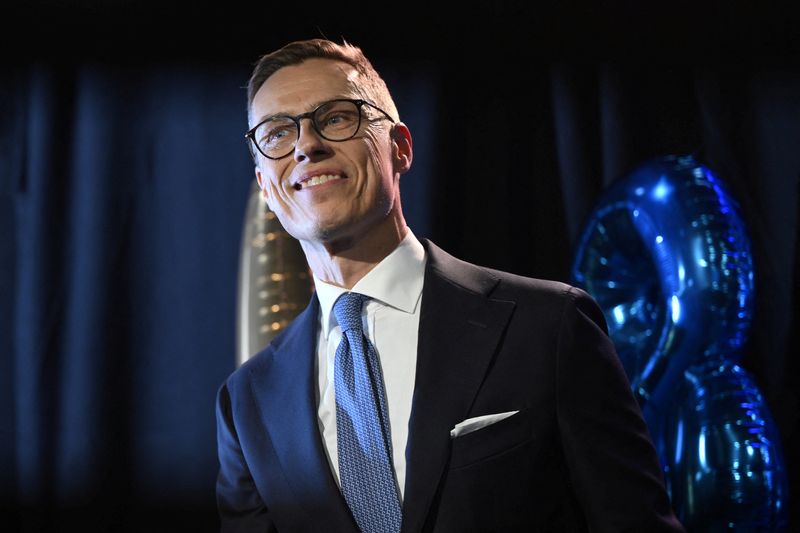By Anne Kauranen
HELSINKI (Reuters) – Alexander Stubb declared himself winner of Finland’s presidential election on Sunday after a campaign built on promises to make the most of his country’s new membership of NATO and back Ukraine in its war with shared neighbour Russia.
In his new job, the centre-right former prime minister and investment banker will head up foreign and security policy, represent Finland in NATO meetings and act as Commander-in-Chief of the military.
It is “very important that we in Europe take care of our own defence,” the 55-year-old told Reuters in the buildup to the vote. He said he agreed with his predecessor Sauli Niinisto “who said that we need a more European NATO”.
The new job marks Stubb’s return to domestic politics after several years abroad working as vice president of the European Investment Bank and director at the European University Institute in Florence.
Allies describe him as a multi-lingual, pro-European, fiscal conservative. He describes himself as a moderate.
He would be “a Western president in many ways” and lean towards the United States, Britain and Nordic neighbours when it came to setting the tone of foreign policy, he told Reuters.
He would set “no limits” to Finland’s support for Ukraine.
“My starting point is, paraphrasing (European Central Bank President) Mario Draghi, whatever it takes,” Stubb said.
The Nordic nation joined the Western military alliance in April last year, breaking with decades of non-alignment in response to Russia’s invasion of Ukraine.
During his election campaign Stubb said Finland should be an active NATO member and seek to have some NATO troops stationed on its territory.
He has also said he would be ready to let nuclear weapons be transported through the country – though not stored there. “At times, a nuclear weapon is a guarantee of peace,” he said at a debate.
Many Finns also see cosmopolitan Stubb as a candidate of the Helsinki elite, according to University of Helsinki political scientist Johanna Vuorelma. “The visible and well-known names of the business world are strongly behind Stubb,” Vuorelma said.
But that was an image he tried to shift during his campaign, by speaking favourably of Finland’s social-democratic welfare model, she added.
As far back as the 1990s, it was clear that foreign policy was one of his strengths, even though over the years there were questions “over what the level of his domestic political expertise and interest in it was,” the head of Finland’s Centre for Parliamentary Studies, Markku Jokisipila, said.
Stubb served as a Member of the European Parliament from 2004 to 2008 before moving home to kick off a political career capped by a string of ministerial posts – foreign affairs, European affairs and trade, finance and then prime minister in 2014-2015. He was ousted in 2016 as chair of the National Coalition Party that he still represents.
Stubb is a keen amateur athlete and triathlon champion – though he has said he will cut down on sport once he becomes Finland’s 13th president.
He is married to British-born lawyer Suzanne Innes-Stubb, 54, with whom he has two grown-up children.
(Reporting by Anne Kauranen; Editing by Andrew Heavens)




